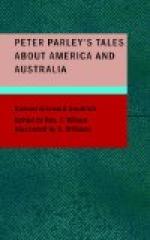The old Indian said no more: he looked sad, and his two sons looked sad also; and I shall never forget the impression his story made upon my mind.
Thus, these good Indians, with a kind of melancholy pleasure, recite the long history of their sufferings; and often have I listened to their painful details, until I have felt ashamed of being a white man.
A few days after this we set out upon another hunting excursion, and again climbed the mountains. We had proceeded some distance when we heard the report of a gun, and coming round the point of a rock which lay just before us, we saw a Delaware Indian hunter, who had just discharged his carabine at a huge bear, and broken its backbone; the animal fell, and set up a most plaintive cry; something like that of the panther when he is hungry.
The Indian includes all savage beasts in the number of his enemies, and when he has conquered one, he taunts him before he kills him, in the same strain as he would a conquered enemy of a hostile tribe.
Instead of giving the bear another shot, the hunter stood close to him, and addressed him in these words:—
[Illustration]
“Hark ye! bear; you are a coward, and no warrior, as you pretend to be. Were you a warrior, you would show it by your firmness, and would not cry and whimper, like an old woman. You know, bear, that our tribes are at war with each other, and that yours were the aggressors.” As you may suppose, I was not a little surprised at the delivery of this curious invective.
CHAPTER XV.
Parley tells about the United states.
The English settlements in America grew very rapidly into power and importance. The French settlements also increased in extent and influence, and a rivalry between the French and English, fostered and nourished by the “natural enmity” which was said to subsist between the Gauls and the Britons, broke out at last in terrible warfare. War is very frightful under any circumstances. It looks very much like murder; and, even at the best of times, a battle-field reminds us of Cain and Abel. Brother slaughters brother, and the conqueror rejoices and describes his sanguinary work as “a glorious victory.” In the war between the English and French settlers in America, a new and atrocious feature was introduced. The Indians were engaged, for pay and powder, on either side, to commit the most hideous cruelties; and things were done which must not be told here, but the very thought of which should make us shudder and turn pale.
The English got the better of the French, and they took Quebec, a strong city in Canada. General Wolfe, a young man and an excellent soldier, captured the city; but it cost him his life. During the heat of the engagement, Wolfe was shot. “Support me,” said he to an officer near him; “do not let my brave fellows see my face!” He was removed to the rear, and water was brought to quench his thirst. Just then a cry was heard, “They run! they run!” “Who runs?” exclaimed Wolfe, faintly raising himself. “The enemy!” was the reply. “Then,” said he, “I die content,” and expired.




